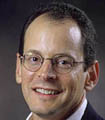
It was the unhappiest decade of my life.
Today I know why: Recent research in economics, psychology and neuroscience shows that aging has an independent effect on life satisfaction, separate from factors such as health, wealth and other life circumstances. In other words, time is not an emotionally neutral backdrop. Instead, its effect on happiness is U-shaped: Other things being equal, people's life satisfaction tends to decline from their early 20s until midlife, then turns around at about age 50.
Armed with this knowledge, I often wish I could go back and warn the pre-40 me of what was coming. I first started to notice the onset of nagging dissatisfaction around my 40th birthday; I figured it would pass. But counting my blessings, as I often did, only deepened my funk. As my 40s went on, the perplexing feelings of restlessness and regret deepened. At 45, I attained the highest prize in my profession, yet not even that success hushed the inner critics saying I had wasted my life. By my late 40s, I painfully concluded that dissatisfaction and ingratitude were my new normal.
And then, around age 50, I noticed a change. The restlessness receded; the inner critics grew less strident. It was subtle at first, then unmistakable — and, as my 50s unfolded, satisfaction and gratitude returned.
What I have learned since then is that mine was a textbook case. Midlife slumps manifest in countries and cultures all over the world, and a version has turned up even in chimps and orangutans. It seems to be an emotional reboot that shifts our goals and values away from achievement and social competition and toward investing more in community and interpersonal connection. In other words, it is a period of emotional and social transition — akin, in that respect, to adolescence, though without the immaturity and pimples.
In another respect, however the two life stages are very different. Parents, schools and society all grasp that adolescence is an often turbulent time, and so they provide all kinds of buffers and supports to help kids through it. Teens may struggle with adjustment, but they know they are not abnormal, and they are not left to cope on their own.
By contrast, there was no accurate social template for what I experienced. The standard frame for unhappiness in your 40s is a disruptive, irresponsible "midlife crisis." But what I felt — and what most people feel — was grinding, but gradual. It was the opposite of a crisis.
The fact that I was a high achiever made matters worse. To motivate us to seek status and success, our brains lead us to expect that worldly achievement will bring emotional fulfillment. In a pattern known as the "hedonic treadmill," however, each increment of status leads us to crave yet more. The perverse result is that people who are objectively more successful often feel subjectively more disappointed. To me, this felt like an emotional ambush.
I also made some common mistakes, starting with what scholars call attribution error. Struggling to find a reason for my unhappiness, I blamed my career. Fortunately, I didn't act on fantasies of quitting my job and starting over. Abandoning my career would have been a costly move that solved nothing.
Meanwhile, however, I began to be alarmed about my feelings of unhappiness, launching myself into a self-recriminatory cycle that Hannes Schwandt, the economist who first described it, calls a negative-feedback effect. "Since you're disappointed," he says, "your life satisfaction decreases and you feel even worse about that. You're in a downward spiral." So pronounced is this effect that it can drive midlife malaise all on its own. In other words, midlife slump can be literally about nothing, amplifying itself in a kind of emotional echo-chamber.
Because I felt something had gone wrong with me, I made a third mistake: I treated my malaise as a shameful secret. I didn't want to be told I needed medication, to be teased about having a midlife crisis, or to reveal my vulnerability and ingratitude. I didn't even tell my husband how I felt. And so misattribution, pessimism, and isolation interlocked and reinforced one another.
So if I could rerun the tape, knowing what I know now, what would I do?
First, I would warn myself: Midlife springs emotional ambushes. But just knowing that fact reduces their capacity to instill alarm and pessimism.
Second, I would go easier on myself. I would regard my 40s slump as a normal, if unpleasant, stage of adult development, and try not to beat up on myself for it.
Third, I would let time do more of the work. Instead of trying to talk myself out of dissatisfaction, I would cultivate patience and acceptance. For most people, the slump not only ends but leads to a surprising rebirth of contentment in late adulthood.
Fourth, I would do a lot more reaching out to other people. Connecting with others cracks open the echo chamber; it reduces isolation and shame and helps preserve a level-headed outlook.
From my deep dive into the research of midlife and from my own passage around the U-turn, the main thing I have learned is the importance of others. Midlife is a time of mastery and accomplishment, but also of unexpected vulnerability and need. It is not a voyage we should attempt on our own.
Jonathan Rauch
Los Angeles Times
(TNS)
Jonathan Rauch, a senior fellow at the Brookings Institution, is the author of "The Happiness Curve: Why Life Gets Better After 50." (Buy it in KINDLE version at a 48% discount by clicking here OR in hardcover at a 40% discount! by clicking here. Sales help fund JWR. )


 Contact The Editor
Contact The Editor
 Articles By This Author
Articles By This Author